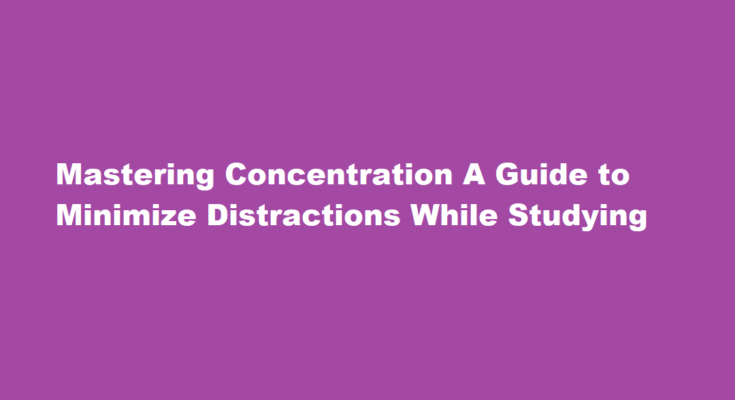Introduction
In today’s fast-paced digital age, maintaining focus while studying can be a daunting challenge. The constant influx of notifications, social media updates, and other distractions can derail even the most dedicated learners. However, with a strategic approach and some effective techniques, it is possible to limit distractions and create an optimal environment for focused studying. This article presents a comprehensive guide to help students and learners of all ages master the art of concentration and boost their productivity.
Design Your Study Space for Success
Creating a conducive study environment is the first step in minimizing distractions. Choose a quiet and clutter-free area that is solely dedicated to studying. Ensure proper lighting and ventilation to maintain alertness. Keep your study tools and materials organized so you don’t waste time searching for them. Minimize visual distractions by decluttering your space and using neutral colors
Set Clear Goals and a Study Schedule
Establishing clear objectives and a study schedule can significantly enhance your focus. Break down your study sessions into manageable blocks of time, typically 25-30 minutes (Pomodoro Technique), followed by a short break. During these focused intervals, commit to working solely on your study material without interruptions. Having a schedule in place helps train your mind to anticipate dedicated study periods, reducing the temptation to engage in distractions.
Embrace Digital Discipline
While technology can be a valuable learning tool, it can also be a major distraction. During study sessions, turn off notifications on your devices, or even better, keep them in another room. Utilize website blockers or apps that restrict access to distracting websites or apps during study time.
Practice Mindfulness and Meditation
Mindfulness techniques and meditation can enhance your ability to concentrate. Engage in deep breathing exercises before starting your study session to calm your mind. If you find your attention wavering, take a moment to refocus by paying attention to your breath. Over time, these practices can improve your concentration and help you regain focus quickly.
Prioritize and Organize Tasks
Create a to-do list for each study session to prioritize tasks. Knowing exactly what needs to be accomplished keeps you on track and minimizes the chance of switching to less important activities. As you complete tasks, you’ll experience a sense of accomplishment that fuels your motivation to stay focused.
Engage in Active Learning
Passive reading can lead to wandering thoughts. Instead, practice active learning techniques like summarizing sections in your own words, teaching the material to an imaginary audience, or jotting down questions for later review. These methods require active engagement, making it harder for your mind to drift.
Stay Hydrated and Take Breaks
Dehydration can impair cognitive function, leading to reduced focus. Keep a water bottle nearby to stay hydrated. Additionally, regular breaks are crucial. Use your breaks to stretch, walk around, or perform quick exercises to refresh your mind. Stepping away from your study space prevents burnout and maintains your productivity.
Frequently Asked Questions
What is the main distraction for you when you are trying to study?
Sometimes the learners need to spend hours focused on a certain activity, which is not easy when there are numerous distractions working against them. Among the most well-known distractions of the modern days there are friends, family, work, phone, computer and physical needs.
What are the causes of distraction?
Distractions can be external (such as noise) or internal (such as fatigue, rumination, or stress). Distractions may be caused by a number of factors, including the loss of interest in the primary activity, inability to pay attention due to various reasons, or intensity of the distractor.
Conclusion
Mastering concentration requires dedication and practice, but the rewards in terms of increased productivity and improved learning outcomes are well worth the effort. By designing an optimal study environment, setting clear goals, embracing mindfulness, and implementing focused study techniques, you can minimize distractions and pave the way for effective studying.
In a world full of distractions, the ability to concentrate is a valuable skill that can set you apart as a focused and accomplished learner. Commit to these strategies, and you’ll find yourself achieving more in your study sessions while cultivating a disciplined and attentive mind.
Read Also : Managing Triglycerides Your Comprehensive Guide to Lowering Levels



